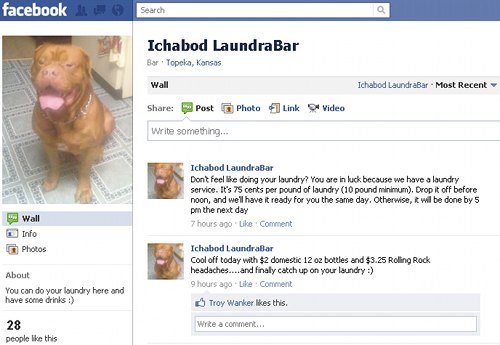
I don’t mind do-it-yourself (DIY) marketing efforts when the do-it-yourselfer is earnestly trying to make an impact. I sincerely try to help them with good tips and ideas. Let’s face it, though, it is easy to laugh at the majority of novice marketing efforts.
I can drone on about terrible marketing, but so much of it has already been said. I mean, I already tried to warn people with “7 Reasons Your Marketing Sucks“, and there are many really useful articles in my blog archive.
For some people, there is simply little future of a marketing career. Reading about it, talking about it, Facebooking about it, tweeting about it, and trying their very best will simply reflect the long-standing rules of survival of the fittest.
These are the creators of marketing efforts that make room for a new spot on Darwin’s evolutionary chart. You can call me a jerk for pointing them out, but pointing out weakness and explaining a better way ultimately serves a greater purpose. Besides just that, the marketing hall of shame is often good for a laugh. I find a lot of laughable examples online, and I will share some of them again, in case you missed these earlier articles. Each of them make good points about bad marketing.
- Bloomingdale’s department stores: Will Bloomingdale’s Sue Over Meta Tags and a Link?
- NASCAR race teams: NASCAR Start and Park Sponsorship is Marketing Absurdity
- Fisker Automotive: Fisker Automotive Fisker Karma vs. Social Media Karma
- The Wizard: Hiring SEO Tip: The Wizard Mutual Fund Management Cannot Bullshit Me!
- Ray Skillman: Ray Skillman, Indianapolis Car Dealer Review: Bad Social Media and SEO
- Suture Express: Suture Express Executives Scramble to Fix Lies
- US Airways: Is US Airways Listening to Social Media? Are You Listening?.
I respect the value of polarizing an audience and not trying to make everybody happy, but apparently some people think it means to just randomly turn away business without forethought or purpose.
Enter a Dog Infested “Ichabod LaundraBar”
What do you picture when you think about your laundry? Maybe a summer breeze blowing as your clothes hang on the line at the edge of a grassy meadow? Maybe nicely folded fluffy towels dropping one upon another in a perfectly lit studio re-enactment of your laundry day bliss? I guess some laundry detergent corporations try to promote that, but let’s use some brain cells, and let’s begin today!
Those paint a beautiful picture, but can you imagine all of those nasty bugs you will find in your pockets and the airborne dirt and pollen making your shirts look like crap? As for the glamor of those fluffy towels, if that looks so compelling, I welcome you to come and fold my laundry.
Let me tell you, we have a laundry company in my town that can take those bugs and airborne filth to a whole new level! They can make the vision of clean and fluffy towels and turn them into sour and musty rags that you found crumpled up behind a washing machine.
Branding Tip: Public Does Not See it Like You Do!
Really? Can the marketing of a company truly make that significant of a difference in consumer impression? Yes, my friends, it can … and it hit me with a nasty whiff of mildew and dog poo just moments ago when I witnessed the profile photo of a laundry bar Facebook Page that I would describe as a really nasty looking mouth-breathing hell hound.
Let me skip back a step. Have you heard of a laundry bar? It is the kind of place where college students can mingle in their worst laundry day attire, but they don’t mind, because they can also buy a cheap beer! I am sure that some of us who were around before the laundry bar concept can remember setting aside a cool pair of acid washed jeans and a nice Guess shirt before heading off for our laundry day humility, but there is no need for that today. At a laundry bar, the otherwise scrutinizing eyes of those sexy people around you will be blurred with suds of another sort. Beer!
What I just cannot wrap my mind around is how a dog logically fits into that picture. If it requires a story of how that dog safely landed an airliner full of laundry executives and saved hundreds of lives after the pilot died from ring around the collar, just to understand it, then it is not good branding.
Would You Market a Laundry Bar Like This?
In my opinion, they should be running some A/B comparison testing across various demographics between items such as follows:
A.) “Laundry Sucks: You may as well have a beer and shoot some pool.”
B.) “Hot Guys Do Laundry: This is where the ladies come to watch them do it!”
Then they could measure which ad achieved the greater response rate, and among which test demographic. Then they could begin to build a customer model to help guide their other marketing efforts more efficiently. No, that probably sounds too scientifickey and complex. That kind of thing is surely only useful for big Fortune 500 companies, right? That is not for this company, so they roll with the ghetto dog theme, instead.
I’m talking about a laundry bar. Better yet, a laundry bar across the street from a university. There is surely a better way to reach potential customers!
Finding your way in marketing and knowing how to rally the customers takes more than a quick moment at the computer. It should involve a lot of steps, including data collection, forecasting, psychographic modeling, and a lot more. The best results come with big portions of marketing talent and creativity.
Maybe they think their best target demographic places little value on cleanliness, or is at least very relaxed about it. Maybe they just didn’t think about it at all. As long as that is the case, they will probably do better to stick with the party crowd, and de-emphasize promoting their full-service laundry.
Ichabod LaundraBar Marketing Department Brilliance
This brings me to a point of how DIY marketing can take a huge fundamental turn toward failure. Many companies will see themselves in a totally blurred way. They think they know how others view their brand, but they screw it all up in their creatively destructive ways. In this case, it is a traditionally sacred space of college students … a laundry bar. They are pushing for a broadened market that has some money to spend. So, they seek busy people like me to drop off my clothes to be laundered, and then pick them up later. That is great, but we have about a squillion places in town that offer laundry services. This is the only one that gives me the strong impression that my laundry may come back with more filth than when I dropped it off.

I may be the minority here. I have not done the market research for this company, and I don’t know them at all. I am just an outside observer, just like anybody else who encounters them. However, it seems pretty clear to me that a smiling bartender serving a box of detergent and a mug of beer is a whole lot more appealing than promoting clean laundry with a hairy, drooling, mouth-breathing hell hound. To me, that is extremely repulsive, regardless of how cuddly, loving, sweet smelling, clean, and obedient that dog is … it is a DOG! Even to dog lovers, it still surely feels a lot less clean than their own dog’s slobber, hair, dander, and poo.
In my opinion, putting a big hairy slobbering dog on a Facebook Page promoting clean laundry makes about as much sense as a Doberman having a love affair with a Chihuahua. It not only paints a picture of absurdity, it cannot be a very productive relationship.
I wrote a nice four step plan for Facebook marketing. It covered the steps of creating a Facebook Page, customer modeling, promoting, and growing awesomeness. It does not include random placement of dog photos. Here you go:
Facebook Marketing: Pages, Customer Modeling, Promoting, and Awesomeness
Effective DIY Marketing Requires Thinking Before Doing!
Why do companies still try to do their own marketing without at least thinking before they click? I may never understand it, but I welcome even the worst marketers to subscribe and learn, before they end up with people who are not as nice as me to explain things. People may call me a bastard, a jerk, a prick, or an ass for pointing things out this way. What they will likely never notice is that my saying it is a whole lot kinder than the way others point it out. They don’t say a word about it, and they simply take their money somewhere else. In this case, somewhere more hygienic.
People who believe that simply putting their company name on Facebook is a good idea, without any marketing strategy that is defined beyond “tell more people” or “make more money” are exactly why I very seldom work with small companies. Far too many small companies are doomed to remain small, simply because they are too impatient, apathetic, or their thinking is otherwise crippled.
OK, dog lovers … go ahead and tell me how brilliant it is and why you think the dog is so damn adorable. Your comments are welcome.
I wish them the best, and I hope they will feel free to reach out for some free ideas anytime.
Podcast: Play in new window | Download









